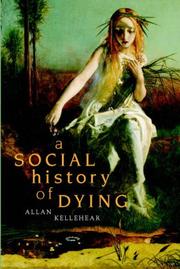| Listing 1 - 2 of 2 |
Sort by
|

ISBN: 9780521694292 0521694299 9780511481352 9780511296260 0511296266 0511292295 9780511292293 0511295499 9780511295492 1107158338 128095941X 9786610959419 1139132741 0511293895 0511481357 0511294697 Year: 2007 Publisher: Cambridge : Cambridge University Press,
Abstract | Keywords | Export | Availability | Bookmark
 Loading...
Loading...Choose an application
- Reference Manager
- EndNote
- RefWorks (Direct export to RefWorks)
Our experiences of dying have been shaped by ancient ideas about death and social responsibility at the end of life. From Stone Age ideas about dying as otherworld journey to the contemporary Cosmopolitan Age of dying in nursing homes, Allan Kellehear takes the reader on a 2 million year journey of discovery that covers the major challenges we will all eventually face: anticipating, preparing, taming and timing for our eventual deaths. This book, first published in 2007, is a major review of the human and clinical sciences literature about human dying conduct. The historical approach of this book places our recent images of cancer dying and medical care in broader historical, epidemiological and global context. Professor Kellehear argues that we are witnessing a rise in shameful forms of dying. It is not cancer, heart disease or medical science that presents modern dying conduct with its greatest moral tests, but rather poverty, ageing and social exclusion.
Death. --- Death --- Mort --- Social aspects --- History. --- Aspect social --- Dying --- End of life --- Life --- Terminal care --- Terminally ill --- Thanatology --- Social aspects&delete& --- History --- Philosophy --- Arts and Humanities --- Funeral rites and ceremonies
Book
ISBN: 0231544022 Year: 2020 Publisher: New York, New York State : Columbia University Press,
Abstract | Keywords | Export | Availability | Bookmark
 Loading...
Loading...Choose an application
- Reference Manager
- EndNote
- RefWorks (Direct export to RefWorks)
About 30 percent of hospice patients report a “visitation” by someone who is not there, a phenomenon known in end-of-life care as a deathbed vision. These visions can be of dead friends or family members and occur on average three days before death. Strikingly, individuals from wildly diverse geographic regions and religions—from New York to Japan to Moldova to Papua New Guinea—report similar visions. Appearances of our dead during serious illness, crises, or bereavement are as old as the historical record. But in recent years, we have tended to explain them in either the fantastical terms of the supernatural or the reductive terms of neuroscience.This book is about how, when, and why our dead visit us. Allan Kellehear—a medical sociologist and expert on death, dying, and palliative care—has gathered data and conducted studies on these experiences across cultures. He also draws on the long-neglected work of early anthropologists who developed cultural explanations about why the dead visit. Deathbed visions conform to the rituals that underpin basic social relations and expectations—customs of greeting, support, exchange, gift-giving, and vigils—because the dead must communicate with us in a social language that we recognize. Kellehear emphasizes the personal consequences for those who encounter these visions, revealing their significance for how the dying person makes meaning of their experiences. Providing vital understanding of a widespread yet mysterious phenomenon, Visitors at the End of Life offers insights for palliative care professionals, researchers, and the bereaved.
Spirits --- Death --- Social aspects.
| Listing 1 - 2 of 2 |
Sort by
|

 Search
Search Feedback
Feedback About
About Help
Help News
News